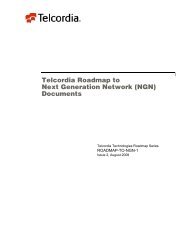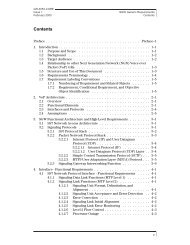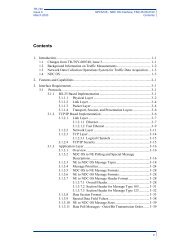Telcordia 2012 Generic Requirements (GR) Offers
Telcordia 2012 Generic Requirements (GR) Offers
Telcordia 2012 Generic Requirements (GR) Offers
Create successful ePaper yourself
Turn your PDF publications into a flip-book with our unique Google optimized e-Paper software.
SR-6002<br />
<strong>Telcordia</strong> <strong>Generic</strong> <strong>Requirements</strong>: <strong>2012</strong> <strong>Offers</strong> Issue 3, September 2011<br />
2.9 Reliability and Quality<br />
Document Proposed: <strong>GR</strong>-230-CORE, Issue 3 — <strong>Generic</strong> <strong>Requirements</strong> for<br />
Engineering Complaints<br />
Project Manager: David Freides, + 1.732.699.6095<br />
E-mail: dfreides@telcordia.com<br />
Projected Start Date: January <strong>2012</strong> (subject to contracted participation level)<br />
Estimated Completion: April <strong>2012</strong><br />
Est. Project Fee: $15,000 (includes Enterprise License for <strong>GR</strong>-230, Issue 3)<br />
Project Description: An Engineering Complaint (EC) is a mechanism used by customers to<br />
document a problem to the supplier for resolution. An EC is used to report unsatisfactory<br />
conditions or performance of a supplier’s product or services. Resolution of ECs is a<br />
cooperative effort between a customer and a supplier. The purpose of <strong>GR</strong>-230 is to provide the<br />
industry with generic requirements for a supplier and its customers to effectively<br />
communicate about ECs. This includes information about the applicable uses of an EC,<br />
supplier and customer roles and responsibilities, and the forms and reports to be provided.<br />
Suppliers and service providers can reduce their costs associated with ECs by following a<br />
common process that provides information in a consistent format and in an expected time<br />
frame.<br />
The proposed update of <strong>GR</strong>-230 is expected to address several key industry issues, including:<br />
Updating the applicable and non-applicable uses of ECs<br />
Determining when the EC process versus another process should be used to report a<br />
product defect<br />
Investigating requirements for a supplier to send an accepted EC to all its customers<br />
Updating requirements for an EC under emergency conditions<br />
Determining time frames for the EC Monitoring/Investigating phase and the<br />
Implementation and Closure phase<br />
Revising EC Documentation form content<br />
Creating EC Closure Criteria requirements<br />
Revising the Major System List to be consistent with <strong>GR</strong>-209-CORE.<br />
The Value of Participation<br />
Participants will have the opportunity to work with peer EC coordinators and <strong>Telcordia</strong> to<br />
define the industry-recognized EC process requirements. Participants will benefit from<br />
understanding different industry perspectives and the drivers for changes to the requirements.<br />
The changes can improve EC process efficiency, thus resulting in cost savings for suppliers<br />
and service providers.<br />
<strong>Telcordia</strong> Invites Your Participation<br />
To proceed with this project, it is expected that <strong>Telcordia</strong> will need at least three industry<br />
participants. While the project can proceed with fewer participants, deliverables may change<br />
as a result. The participating industry members will be apprised regularly of project status and<br />
any changes in deliverables.<br />
2–28





